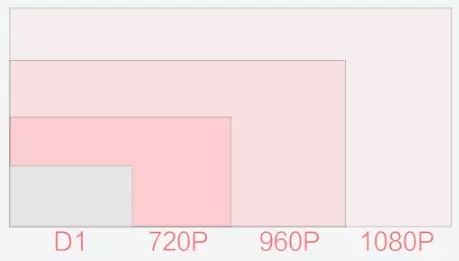In the parameter setting of the network camera (IPC), some of the following parameter settings may not know the specific meaning of these parameters. The following are some common parameters (encoding mode, resolution, frame rate, code flow control, I frame interval etc.) to explain what it means.
1. Coding Mode (CODING MODE):
1. H.264
H.264 is a highly compressed video codec standard following MPEG-1, MPEG-2 and MPEG-4, and its compression efficiency is twice as high as that of MPEG-2 at the same graphic quality
2. H.265
H.265 is a new video coding standard formulated by ITU-T VCEG following H.264. On the basis of the original standard, it improves the relationship between code stream, coding quality, delay and algorithm complexity, making the coding optimal .
3. MJPEG
Montion Joint Photographic Experts Group, that is, motion still image (or frame-by-frame) compression technology
4. MPEG-4
MPEG-4 is a format developed by MPEG-2, which is used to transmit video data during low-speed transmission
5. SVAC
Surveillance Video and Audio Coding (Surveillance Video and Audio Coding) is a technical standard that addresses the unique requirements of the security monitoring industry
2. Resolution (RESOLUTION)
Resolution includes display resolution and image resolution. Display resolution refers to the number of display pixels per unit area; image resolution refers to the amount of information stored in the image, which is how many pixels per inch of the image.

1. D1
D1 is the standard for the display format of the digital television system.
2. 720P
720P is a display format with a resolution of 1280×720 under progressive scan. The number 720 indicates that there are 720 horizontal scanning lines in the vertical direction, and the letter P (Progressive scan) indicates progressive scanning.
3. 960P
960P is a display format with a resolution of 1280×960 under progressive scan. The number 960 indicates that there are 960 horizontal scanning lines in the vertical direction, and the letter P (Progressive scan) indicates progressive scanning.
4. 1080P
1080P is a display format with a resolution of 1920×1080 under progressive scanning. The number 1080 means that there are 1080 horizontal scan lines in the vertical direction, and the letter P (Progressive scan) means progressive scan.
3. FRAME RATE
The number of frames displayed per second (Frames per Second) describes the update frequency of the video stream, and the unit is FPS or Hz.
4. Bitstream Control (BITSTREAM CONTROL)
When the code stream control mode is variable code stream, the camera adjusts the video code stream in real time according to the network bandwidth to ensure the normal display of the video screen when the network bandwidth is insufficient.
5. I frame interval (IFRAME INTERVAL)
The number of interval frames between two I frames. I frames are also called key frames, which are used to record the information of the entire image. The larger the value, the smaller the storage space occupied by the compressed video.
6. SVC (SCALABLE VIDEO CODING)
Scalable Video Coding (Scalable Video Coding) is a technology of video coding. It can divide the video stream into a base layer and multiple enhancement layers according to requirements. The base layer provides users with the most basic video quality, frame rate and resolution, and the enhancement layer improves the video quality.
7. Watermark encryption (WATERMARK ENCRYPTION)
To add some digital information that does not affect the integrity of the original file to the data multimedia, so that after the unauthorized user obtains the information, he cannot understand the content of the information because he does not know how the information is processed, so as to ensure the security of the data.
Contact:Mr. Song
Mobile:0086-13316589230
Phone:0755-82789110
Email:mstec@foxmail.com
Address:4th Floor, Block A, No.4, East District, Bantian Shangxue Science Park, LonggangDistrict, Shenzhen City, China
V380 Camera Factory, Produce WiFi Camera, Mini Camera, Solar Camera, IPC Camera and Camera Detector粤ICP备18055889号 Sitemap